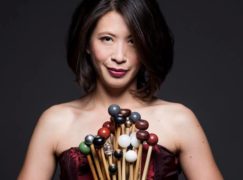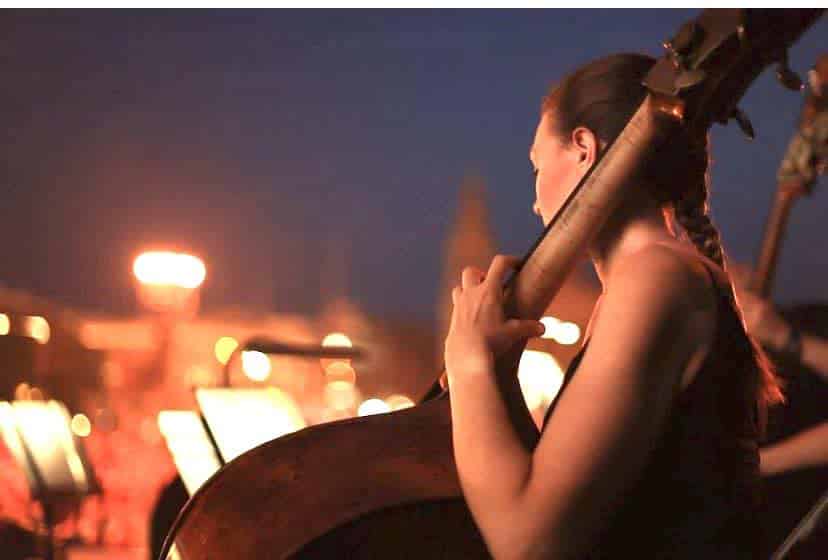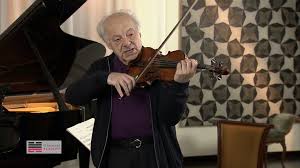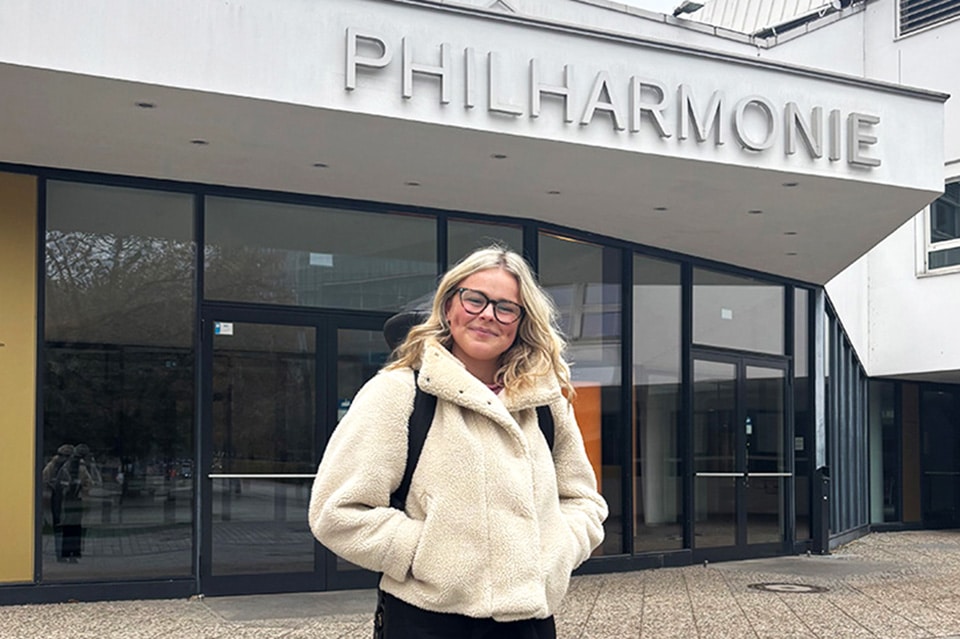In all US symphony orchs, there are just 4 women percussionists
mainWe counted them:
2 in Chicago (including principal Cynthia Yeh)

1 in Philadelphia
1 each in Hawaii and Rochester.
This looks like a closed shop.
We also hear that the number of young women inducted into the New World Symphony has been falling year by year. The orchestra does not use a screen for auditions.





Which one is the rarer species: male harpist or female percussionist?
Why do you want to know?
I am just curious and nosy!
Good man! 🙂 Anyway, don’t know many male harpists, apart from Zabaleta and Witsenburg (Dutch).and the chap who sometimes plays in the Plaza de Espana in Benalmadena Pueblo in Spain.
LSO has a male Principal Harp. Bryn Lewis.
Douglas Rioth, San Francisco Symphony.
Xavier de Maistre, formerly of the BRSO and the Vienna Philharmonic.
Robert Johnston, over 40 years at the CBSO until his retirement 3 years ago.
– Andreas Mildner, WDR Sinfonieorchester
– David Lootvoet, Orchestre de l’Opéra de Paris
– Nicolas Tulliez, Orchestre Philharmonique de Radio France
– Stephen Fitzpatrick, Staatskapelle Berlin
– Volker Kempf, Wiener Symphoniker
– Werner Karlinger, Bruckner Orchester Linz
– Christoph Bielefeld, Bruckner Orchester Linz
– Emmanuel Ceysson, Metropolitan Opera Orchestra (previously Orchestre de l’Opéra de Paris)
Elayne Jones, who memorably recorded Bartok with Leopold Stokowski for RCA Victor, was a percussionist who sued over what she believed to be sexism, or perhaps sexism/racism — I think it was the San Francisco Symphony — decades ago. I do not know what the resolution was but she was a very rare female percussionist at the time. Certainly her resume was glittering enough to make her complaint plausible.
Not sure why it matters for this discussion, but since it was raised, another male harpist worth remembering is Edward Druzinski of the Chicago Symphony. It would be a pity for such a fine artist to be forgotten. Ditto for Osian Ellis.
Elayne Jones was quickly picked up by the San Francisco Opera Orchestra and remained there until retiring in 1998.
I believe she’s still alive and writing her memoirs. Should be an interesting read. She worked with Duke Ellington as well.
You’re missing Emily Cornelius, percussionist extraordinaire for years at the NM Phil and Santa Fe Symphony.
So what? Of what possible interest is this information? One presumes that percussionists audition and are awarded the positions according to their abilities, not because of their gender.
The only relevance of the headline is to further what seems to be the “men bad, women good” narrative that increasingly seems to dominate SD.
So what ? Exactly. Why should this matter ? No big deal.
Let’s redo the simple arithmetic… how many in total, Norman?
I’m surprised it’s that low, but it’s probably the same issue as blacks in orchestras: the pipeline. How many female percussionists are there in music schools? How many are there in high school bands or in youth orchestras? How many are auditioning? It’s an interesting statistic but indicative of nothing, other than, most likely, that relatively few girls take up percussion.
Proving that the classical world supports systems of oppression! Classical music is racist, sexist, and transphobic, and probably hates cats! I am outraged!!! OUTRAGED!!!! OUTRAGED!!!! WHY IS NO ONE ELSE OUTRAGED!!! OUTRAGED!!!
What do you mean:no one else? I’m LIVID!
As a teenager, I auditioned on drums for a band. I had the advantage of being male but I didn’t get the gig. At the time I was OUTRAGED!
I admit that I was total crap but nevertheless…!
The pool of potential female percussionists is greatly thinned-out in the teenage years as they become disenchanted with the increasing amount of heavy or awkward equipment that must be hauled around and set up just to satisfy the need for a few notes here and there in a large work.
I also suspect the proportion of female precussionist parents who are supportive their daughter’s ambitions is exceedingly tiny.
Violin, clarinet… even tuba… not as much to carry but a more satisfying performing experience for having done so.
If you see a girl drummer in a rock band you are seeing someone who is unusually dedicated to it and had unusual parents.
My parents always encouraged me in knocking down any obstacle getting in my way and thus, when young, I went to the conservatory to study percussion. But after 2 years I gave it up because when you are actually encouraged to bang on things, lots of the fun disappears. It’s much nicer to be subversive in more indirect ways, like under the cover of simple administration work.
Sally
I will have to investigate that.
Are you… answering to your own comment ?
Don’t you have any pride?
Seriously, dude… get a life!
As usual, you don’t understand. It is my PA who uses my account sometimes when I don’t look. And she bears a deep contempt for your comments, I have to inform you. I suspect she is working on a collection of your worst expostulations with the intention to file a complaint at Norman’s Public Relations Service.
Percussionist here. I’m a small woman and I’ve NEVER been discouraged by lifting heavy gear. That’s just ridiculous. There’s nothing so heavy in the percussion section that it would turn me off.
There are a lot of reasons fewer girls do percussion. It’s unpleasant to be treated as the odd one out. Boys can act like jerks when they’re all together. It’s hard to break into boys club ensembles. I know many women who are great players and struggle to find gigs because the boys ask the boys. We don’t care about gender norms, but men seem to care a lot.
However when I taught at an all-girls school and an all-boys school, I had far more girl students than boys. That indicates to me that it’s not the nature of percussion that turns girls off – it’s the boys.
Are you saying that women aren’t as strong as men?!?!?!?! That’s OUTRAGEOUS. You must be a member of the evil patriarchy. Billie Jean King proved that women are stronger and more fit than men 40 years ago.
Bill Jean King played with Bobby Riggs, who was 26 years older.
I said they were less enchanted with the task, not less able to do it.
But thank you for correctly identifying me as a member of the evil patriarchy none-the-less.
‘This looks like a closed shop.’
Ah. There it is. A classic SD bulls*** slow-news-day sentence. A Lebrecht special.
Well done. Everyone’s very proud of you.
Not sure about that – he can’t add up! 2 in Chicago, 1 in Philadelphia (that’s 3, Norm), and 1 each (that’s 2 more) in Hawaii and Rochester; total 2+1+1+1=5!
When I last looked you had enough fingers on one hand to do that calculation.
Still not many, though. We have lots in the UK.
And the basic numbers are incomplete. Just checking one of the local groups (one with a 7-figure endowment and longer existence than NL) I see a female percussionist they missed.
I know quite a few female percussionists who have not broken into the professional ranks. This isn’t particularly surprising, as they don’t play any better than the male percussionists I know who also haven’t broken into the professional ranks. Given how many percussionists are on the roster of a typical orchestra, and how many violinists, I think maybe the number of opportunities is a significant factor being ignored here. More like it’s a closed shop for most everyone. Are there statistics to be had showing that women are being disproportionately washed out in the round where the screen is not present?
It’s worth watching the CSO/Muti Verdi Requiem from a few years ago just to see Cynthia whacking those bass drums. Looks like she might come off the floor when contact is made! I played the Requiem years ago as a 2nd violin seated immediately in front of the bass drum, and still flinch every time…
Whoops, 8-figure endowment, not 7. Whatever. The point remains that if there are only a small number of opportunities, it will take a long time for a substantial pool of applicants to gain enough experience to be truly competitive and equalize the numbers. Now, if you don’t think prior experience is an important factor in winning auditions and achieving tenure, or even having the opportunity to take the audition, feel free to be wrong…
So many?!
OK, not a major orchestra, but here’s another for you: https://spokanesymphony.org/meet-the-musicians/timpani/. I bet you could find quite a few other female percussionists around the country in other smaller orchestras.
I suggest mandatory, rapid harp courses for male percussion players, and vice versa for female harp players, so in a few weeks they can make a fruitful (mandatory) exchange to make sexists more happy.
Also, more male sopranos and female basses on stage, please.
So why do girls not like to play percussion as much as boys apparently do?
Could all be sorted in no time, if more women started banging the drum.
2+1+1*2=5…?!
In 2005, Dr. Regina Himmelbauer did a survery of 35 major international orchestras and found that only 2.55% of the percussionists were women. Brass were even lower: 1.32% of the trumpets, 0.74% of the trombones. The numbers for these instruments haven’t changed much since then. The survey is here, where you can see the numbers for other instruments as well:
http://www.osborne-conant.org/orchestras.htm
Good info. Thank you so much!
Women armed with a trombone are dangerous.
The Milwaukee Symphony’s principal trombone, Megumi Kanda, is a woman (and had been principal in Albany before that). Whether she is dangerous or not I cannot say. Type her name into YouTube and hear for yourselves.
Any classical musician who informally surveys their memory of the percussionists they knew growing up among youth orchestras, conservatories, or music festivals will suggest that the men far outnumbered the women. Therefore, these numbers merely reflect the broader demographics. To insinuate that pro orchestras have a “closed shop” mentality is another lazy, spurious claim.
I’m sure many pro orchestras could counter this allegation by citing the women who they have hired as substitute percussionists. I’ve seen this to be the case, and demonstrates a more inclusive attitude than what may be reflected by audition results. Which, as we know, are ridiculously competitive, anonymous in the first rounds, and dependent on who actually shows up to take the audition.
My orchestra (not one of those listed) has a female timpanist.
Bully for you.
Hi Phillip! 🙂
That is unfortunate, and for many reasons I hope that the number will increase. However, thanks to the post, now I am curious to hear Cynthia Yeh.
I heard her live multiple times with the Chicago Symphony. I thought she struggled a bit on cymbals in Tchaikovsky’s Romeo and Juliet.
There are certain cymbal parts that everyone struggles with — regardless of gender. Two that immediately come to mind: The final 9 rapid cymbal crashes in the Rimsky-Korsakov orchestration of Mussorgsky’s Night on Bare Mountain. Most percussionists just give up and play a hard stick.
Even more challenging are the 13 rapid cymbal crashes in the middle of the first movement of Chadwick’s Symphonic Sketches (Jubilation). I’ve seen that just one time in concert, and it came across as one big smear (although the percussionist on the Howard Hanson recording in Rochester nails it).
One quick thing from a European perspective…
Most percussionists here do not ‘just give up and play it with a stick’. I would say that at least 75% of the time it is played on a pair. Yes, it is very fast!
I am a member of the Chicago Symphony Chorus and have sat behind Ms. Yeh numerous times. She is an incredibly exacting and focused musician. Whether with drumsticks, mallets, or sledges, she leaves herself at the stage door and embodies the music fully.
Marilyn Rife was principal percussion withe San Antonio Symphony for many years. (She’s now personnel manager with Philadelphia.) Amy Putnam is currently principal percussion with Symphony Tacoma. (She was also principal with the now-defunct Bellevue Philharmonic.)
This is probably 98% due to cultural reasons,
There are less professional girl percussionists than Male professional percussionists, so of course there will be less of women percussionists in professional orchestras. Couple this with the fact that many (pretty sure most) women in our society, due to a combination of culture and biology, still prefer (key word is “prefer”) to step out of the cut throat rat race and have kids and focus on home building rather than single mindedly keep pursuing an ambitious “career” beyond the college years. To pursue a career in orchetra you’re basically practicing 5 hours a day into your mid to late twenties.
I am saddened by the attack and consequent diminishing of gender differences; People get “equal treatment/rights” confused with “gender differences” all the time. Of course it’d be wrong to exclude a women from winning an audition just because she is a women and of course it’d be wrong to discourage a women from pursuing a “Career” if they really wanted to. What we shouldn’t do is try to shoe horn either way…,
So I guess my opinion on this is that some aspects of this “topic/issue” aren’t appropriate to enter into politics.
So is the ration discrepancy really an issue if it’s not down to sexism? (I’m not denying that in some cases it could be)
Lebrecht is apparently a raging heterosexual, who can’t find enough women to satisfy him. Where’s the concern for male harpists? How wonderful someone else brought it up. Even though there has been a big increase in the presence of men playing harp in orchestras in the last two decades, they are still far from having parity, particularly in teaching. And, like other instruments, such as percussion, the strength that men have adds much to their tone quality and projection, though women of equal size and strength can match them. Music is not fair, and not politics. Save your concern for politics.
https://en.wikipedia.org/wiki/The_personal_is_political
Patrician Niemi is a percussionist with the San Francisco Opera orchestra. In fact she wrote a widely acclaimed memoir called “Sticking it Out,” about her life and career.
For a better perspective on this topic, I can recommend a worthy book by a friend and classmate, “Sticking It Out” by Patti Niemi, percussionist of the San Francisco Opera Orchestra, https://www.abebooks.com/9781770412736/Sticking-Out-Juilliard-Orchestra-Pit-1770412735/plp [and please note that I’m not the same commenter as JoshG above, I will only use my full name]
For Spanish readers, here’s a recent article about women holding top percussion and timpani positions in Spain’s 26 full time orchestras.
Mentioned are Carolina Alcaraz (Orq. de Cordoba), Noelia Arco (Orq. Cuidad de Granada), Concepcion San Gregorio (Orq. de la Comunidad de Madrid), Cristina Llorens (Orq. de Cordoba), Susana Pacheco (Orq. de Baleares), Louise Paterson (Orq. de Sevilla). Roxanne Jurkovich (Orq. de Barcelona y Catalunya) is another top player not mentioned in this article.
https://goldenperc.com/mujeres-en-las-orquestas-espanolas/
Special mention to Actea Jimenez, solo timp of the Orq. de Bilboa, who won her 2016 audition with an unprecedented unanimous vote by the audition committee.
http://slippedisc.com/2016/09/where-are-the-women-timps/
That’s 8 high profile female percussion and timpanists in tenured, full time positions in Spain. When Evelyn Glennie comes to solo in Spain, she is warmly received, to say the least!
Stanley and Paula Chaloupka, husband and wife, were harpists with the LA Phil for many years.
AGAIN with the same thing… again and again…
It’s starts to be annoying. Now you’re gonna go by sectionals?
Next week what… Tuba players? Please stop.
PS: it’s 5. not 4.
There are nearly as few women tuba players around. I speak from experience, as an orchestral tuba player. But why say it so spitefully? You would prefer to see none?
Colorado Springs Philharmonic is proud to have percussionist Nena Lorenz and principal harp Matthew Tutsky.
What happened to the female percussionist who wrote “Sticking It Out” which was mainly about her experiences at Julliard and the New World Symphony and spent a lot of years with the San Francisco symphony? Isn’t she still playing in an orchestra?
There are dozens of professional orchestras here in the United States, yet this “statistic” covers a mere handful. Here at the Boise Philharmonic we treasure our female percussionist AND our male harpist. It’s tempting to always focus on “the top ten” orchesras, but the United States is brimming with excellent smaller orchestras which serve their audience with great music well performed. Don’t forget about us.
+1,000
There is a female percussionist in the New World Symphony at this very moment. There are female players in the Fort Wayne Philharmonic, Houston Ballet, Dallas Opera, Michigan Opera Theatre, San Francisco Ballet, Sarasota Orchestra, Spokane Symphony, and many more. If you’re going to try to stir up controversy, at least make a halfway attempt at some actual research.
Of course there are more male percussionists. A lot more. There are far more male conductors, trombone players, sports broadcasters, CEOs, pilots, engineers, and in countless other professions. Luckily our world is changing around us, and if we keep growing and listening and learning, someday we’ll see real gender equality in our society. But for now, this is not the way to inspire more young girls to take up percussion. It will only serve to discourage them, and that’s not what we need. Be a part of the solution, not the problem.
To Mr. Norman LeBrecht–
My name is Maia Foley, and I’m a 17 year old percussion student in Boston at the New England Conservatory Prep School. My friend and section mate in the Youth Philharmonic, Clara Hoey, and I were considering your article recently and were stunned by the vague presumption that “in all the US symphony orch[estra]s, there are just 4* women percussionists” on a number of grounds.
To begin with, the initial figure that you’ve cited is incorrect, and not just by the means of your miscounting of not four, but five listed female players; implying that these five would be Cynthia Yeh and Patricia Dash in Chicago, Angela Zator Nelson in Philadelphia, Becca Laurito in Hawaii, and Jillian Pritchard in Rochester, one of these women would be excluded in your already erroneous claim. Further, the suggestion that only four* female percussionists were active in the industry seemed so disfigured that Clara and I took it upon ourselves to do a study of 282 professional, regional and small-budget orchestras across the country and found not four*, not five, but 88 female percussionists, including Nancy Smith (Principal Percussion, Portland Symphony, ME), Sarah Christianson (Percussion, Civic Orchestra of Chicago, IL), and Christina Carroll (Percussion, River Oaks Chamber Orchestra, TX). This count does not include the 47 orchestras we searched that did not list their roster, nor does it include the multitude of phenomenal college orchestras in the US, including those at the Eastman School of Music and the University of North Texas, the Juilliard School and the New England Conservatory, among a plethora of others, that are proudly inclusive of women in their sections.
Additionally, your count of four* “women” percussionists implies that there are only four* women in the percussion industry, which completely shortcounts the phenomenal female percussionists that work primarily as soloists, professors and other educators in the United States, including Nancy Zeltsman and Ayano Kataoka, and non-classical performers, such as international percussionists like Sheila E, and drum set players like Cindy Blackman. If one were to include female percussionists in youth symphony orchestras around the country, including Clara and myself in one of the nation’s top youth orchestras (NEC’s Youth Philharmonic), I’m sure that you’ll find more than four* female percussionists among them. If you need any more reference for these players, you can look at hitlikeagirl.com– I’m sure you’ll find an abundance of talent of which you were previously unaware.
Further, the comments on your posting have implied that this deficit in female performance as percussionists in the “Big 5” is due to women quitting at a young age because of “awkward or heavy equipment” that they lose the motivation to carry or set up for a less “satisfying playing experience.” However, I’ve found that such setbacks are more reflective on the individual than their gender. Most females that I’ve met that have dropped percussion have done so because of scheduling issues or, unfortunately, men that have told them that they were too weak to play or would never make it through the closed doors of the percussion industry. Of ten young men that I’ve met that have dropped percussion through adolescence, nine of which have been for such mild inconveniences of moving equipment or, more specifically, “too much work.”
Similar comments on your post have cited that the parents of female percussionists cease in supporting their daughters’ pursuits during adolescence and that supportive families are “unusual.” However, I’ve found rather the opposite; speaking from personal experience, my family has been nothing but supportive of my pursuit of percussion and have gone to extensive measures to ensure that have access to the best musical education possible, so long as I apply myself. They’ve pushed me to work harder, if anything, to show me that I can achieve anything that I set my mind to, and have found the same mindset in other parents of female percussionists. At a local music petting zoo for fourth grade students, every one of dozens of students that came to me were little girls whose parents fully supported their choice in instrument.
Furthermore, your article has given Clara and myself much to consider as we reach the end of our time in high school and move on to the end of the adolescence that shall (allegedly) bring an end to our percussive careers. As I continue to prepare to take conservatory auditions and Clara to prepare playing principal timpani on Shostakovich 5 on the Youth Philharmonic tour this spring, we have a new sense of pride in our accomplishment of knowing that we are stronger than meets the eye and, most assuredly, stronger than could ever be required to hold up a pair of cymbals.
Sincerely,
Maia and Clara
(PS. Any and all negative comments will be disregarded– there’s nothing that anyone could say to make us feel shame for being strong.)
+1,000
Go get it, judging from your determination and attitude, you have got what it takes!
P.S. The research for this article from Norman was sloppy and the motive suspect.